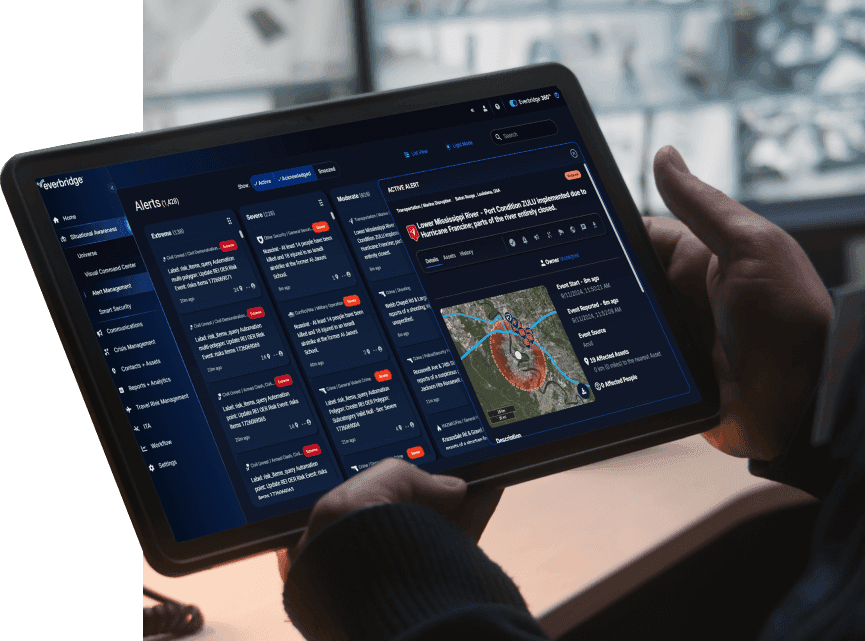By Tracy Reinhold, CSO of Everbridge.
The following article addresses how organizations can navigate global geopolitical waters, and operationalize resilience for their organization, people, and assets.
The ever-changing landscape of global geopolitics can have far-reaching implications for organizations and their employees, especially when long-simmering tensions reach a boiling point, as we are now witnessing in the rapidly escalating conflict between Gaza and Israel.
In times of conflict, it is crucial for organizations to establish resilience strategies that ensure not only the safety of their people but the continuity of their operations in the face of that conflict. Those strategies should prioritize a combination of actionable risk intelligence and data insights, effective crisis communication, and comprehensive travel risk management. By doing so, organizations can continue their operations while safeguarding the well-being of their employees.
Here are some important considerations businesses should keep in mind during these challenging times.
Risk intelligence: knowledge is power
Effective risk intelligence is the cornerstone of any resilient organization. It involves understanding and monitoring the potential risks that could impact an organization and its employees. This goes beyond immediate concerns and involves looking at the bigger picture.

Organizations must stay informed about the situation on the ground through reputable sources, geopolitical analysis, and expert insights, while weeding out disinformation. By understanding the nuances and dynamics of a threatening scenario, organizations can make informed decisions and adapt their strategies accordingly. Regular updates and assessments of the situation will keep organizations ahead of potential risks and enable them to respond quickly and effectively.
Components of effective risk intelligence include:
- Continuous risk monitoring: Staying updated on the geopolitical situation in regions where an organization operates or has travelers. Utilize various sources, including international news, government advisories, and geopolitical intelligence services.
- Scenario analysis: Developing detailed scenarios that assess how different geopolitical outcomes might impact an organization. This proactive approach enables one to be prepared for various possibilities, from minor disruptions to severe crises.
- Stakeholder collaboration: Engaging with experts, industry peers, and government agencies to gain a comprehensive understanding of the risks. Collaborative intelligence can offer valuable insights and guidance.
Robust planning: prepare for contingencies

With the insights gained from risk intelligence, it’s time to develop and implement a comprehensive resilience plan.
Planning for various contingencies is crucial during times of geopolitical tensions. Organizations should develop comprehensive plans that address possible disruptions to operations, travel restrictions, and potential safety concerns. Assessing the potential impact on supply chains, international travels, and local operations is essential. By identifying alternative strategies and diversifying supply chains or business partners, organizations can mitigate risks and maintain operational continuity even amidst uncertainty.
Some key strategies to consider include:
- Redundancy and contingency planning: Creating a robust business continuity plan that outlines how an organization will continue operating during and after a global event. Ensure it covers critical processes, communication protocols, and employee safety.
- Scenario planning: Developing scenarios based on potential risks and their impacts. These scenarios should be the basis for planning and response.
- Cross-functional collaboration: Involving multiple departments and stakeholders in the planning process. Each department should understand its role and responsibilities during a crisis.
- Crisis communication: Preparing clear, transparent communication plans to keep employees informed about the situation. This should include how leaders will communicate during crises and who the designated spokespeople will be.
Travel risk management: prioritize safety
A robust travel risk management program becomes paramount when sending employees to high-risk regions. Proactive risk assessments, personalized itineraries, and constant communication with travelers are key components of effective travel risk management.

It is crucial to provide employees with pre-travel briefings, ensuring they have a clear understanding of the risks and necessary safety precautions. Collaboration with travel risk management providers can bring valuable expertise and on-ground support, providing immediate assistance and evacuations, if needed.
Here are important aspects of a comprehensive travel risk management policy:
- Pre-travel briefings: Equip travelers with up-to-date information on the destination, potential risks, and emergency contact details. Emphasize the importance of situational awareness.
- Communication plans: Establish clear lines of communication with travelers. Use reliable communication channels, apps, and technology for real-time updates and check-ins.
- Duty of care: Ensure that your organization has a robust duty of care program. This means taking steps to protect travelers’ safety and well-being throughout their journey.
- Travel security services: Consider partnering with travel risk management companies that can provide security advice, evacuation services, and medical support in high-risk areas.
Global geopolitical tensions, such as the Gaza-Israel conflict, can pose significant challenges to organizations, but with effective risk intelligence, strategic planning, robust crisis communication, and prioritizing travel risk management, businesses can navigate these difficult times while maintaining operational resilience and ensuring the safety of their employees. In doing so, they demonstrate their commitment to the safety and well-being of their people and the continuity of their operations, even in the most precarious times.
Watch as the Everbridge Risk Intelligence team discusses the latest risk intelligence from the region and how to maximize your critical event management (CEM) deployment to keep your people safe and your organization running.

